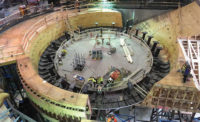Executive News
Viewpoint: Engineering and Construction Ethics Are Not Transactional
A commentary from nine industry chiefs on the changing international business climate

Historically, the construction sector has struggled with issues such as bribery, bid-rigging, pay-to-play and kickbacks. Pressure to prioritize short-term profits can overshadow ethical considerations and lead to a return to past practices. Lack of strong Foreign Corrupt Practices Act enforcement further complicates our ability to uphold these essential principles, nine industry leaders say..
Image courtesy of Astockproductions/Getty Images
The engineering and construction industry is increasingly contending with a transactional environment that challenges the ethical standards of its employers and practitioners. This shift has raised new concerns about integrity and transparency in global work—with the potential to place engineers and corporations in situations where accountability may be compromised.
Historically, the sector has struggled with issues such as bribery, bid-rigging, pay-to-play and kickbacks.
Despite some progress in addressing these challenges, the industry’s reputation continues to suffer, and it is often ranked among the most corrupt sectors, according to Transparency International’s Corruption Perceptions Index. Initiatives to enhance transparency and accountability and establish clear consequences for unethical behavior have yielded improvements in certain regions—but the evolving uncertain and transactional climate poses risks of regression.
The pressure to prioritize short-term profits can overshadow ethical considerations, leading to a return to past unethical practices. Internationally, lack of Foreign Corrupt Practices Act enforcement further complicates our ability to uphold these essential principles. As professionals, we must recognize that adherence to ethical standards is not just a legal obligation but also a cornerstone of our commitment to public welfare.
[Editor’s note: A Feb. 10 executive order has halted investigations and enforcement actions under the 1977 Foreign Corrupt Practices Act for a 180-day “review,” claiming, without presenting evidence, that these “drain resources from both American businesses and law enforcement” and make companies “less competitive.” Legal experts tell Forbes that a weaker or nonexistent law would actually benefit foreign companies and worsen the global business climate for U.S. firms.]
“Initiatives to enhance transparency and accountability and establish clear consequences for unethical behavior have yielded improvements in certain regions—but the evolving uncertain and transactional climate poses risks of regression.”
Statistics illustrate the gravity of the situation: corruption can inflate project costs by up to 30%, diverting vital resources from infrastructure and essential public services. Surveys also indicate a widespread perception of unethical industry behavior, further undermining trust. In response, it is imperative for professionals and companies to reaffirm their dedication to integrity and transparency.
Codes of Ethics held by the National Society of Professional Engineers, the American Society of Civil Engineers and other groups provide essential frameworks to navigate these complexities.
By emphasizing accountability and the public good, we can combat the detrimental effects of a transactional mindset, fostering an environment of trust, professionalism and integrity ensuring quality, safety and sustainability.
We, the undersigned, call on all stakeholders in the engineering and construction sector to prioritize ethics, embrace transparency and reinforce the collective responsibility toward sustainable and equitable growth. Together, we can build a foundation that supports not only the industry but also the communities it serves.
- Robert Prieto
- Paul F. Boulos
- Terry F. Neimeyer
- Anthony S. Bartolomeo
- George J. Pierson
- Nicholas M. DeNichilo
- Thomas R. Warne
- Gregs G. Thomopulos
- Alan L. Boeckmann
[Editor’s note: The signatories are all former chiefs of leading engineering and construction companies working in the U.S. and globally. Each also is a recipient between 2006 and 2024 of the American Society of Civil Engineers Opal Award for management, which annually recognizes exceptional management skill and is akin to lifetime achievement recognition.]
Please direct questions or responses on this viewpoint to Robert Prieto, who can be reached at bob.prieto@strategicprogrammanagement.com



